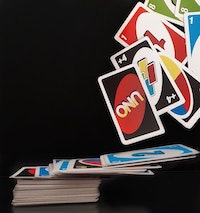
Blue five. Red five. “Uno.” Red seven. Game over. Three in a row over my five-year-old. I’m the strongest man in the world. In your face kindergarten!
I beat my kids. I started beating them when they were young. I enjoy beating them. It’s for their own good. Relax, I’m talking about beating them at games.
When my daughter was four or five we played games incessantly. There’s so much happening in their little brains while playing. And at first, they aren’t very good. Therefore, the tendency of most adults is to go easy or let them win. We’ve all done the old, “Hooray! Mikey won! Amazing job!”
But I’ll let you in on a secret. Kids know when they didn’t earn it.

I realized this when I witnessed a subtle but incredible moment. After beating her a few times at Uno, the next game was different. When she was down to a few cards she paused. Her face changed, she straightened up and boom, she won. She did it through struggle and learning. The pride on her face could only come from her own accomplishment.
Something Powerful Happens When Kids Earn Their Wins
There’s no shortage of false praise these days. Kids yearn for approval from their parents but the difference between encouragement and phony praise can be messy. In Losing is Good For You, Ashley Merryman suggests that “participation trophies and prizes are almost a given, as children are constantly assured that they are winners.”
“By age 4 or 5,” she writes, “children aren’t fooled by all the trophies. They are surprisingly accurate in identifying who excels and who struggles. Those who are outperformed know it and give up, while those who do well feel cheated when they aren’t recognized for their accomplishments.”
Encouraging our kids is good. Nonsensical ego-boosting is bad. Normally I advise against labeling behaviors this way, but in this case, it’s appropriate. It’s more than just a personal theory. For example, Paul Tough’s How Children Succeed shows evidence that brain development is actually altered to become more resilient when kids experience early adversity.
What an Amazing Painting!
Art is an area where silly praise is endless. When kids ask, “do you like it?” our instinct is to respond with some variation of, “I love it! It’s amazing.” This can lead to kids with an overdeveloped reliance on external motivation (and an oversized ego that can have deleterious effects). Long term happiness can never be achieved through external validation alone.
When my kids ask me if I like their art, I turn my response into an opportunity to build internal motivation. I ask questions like, “what do you think about it?” and “why did you choose that color?” They need to learn to pursue goals because they want to. They develop an understanding that we take them seriously but what’s important is how they feel about what they do. We live in a subjective world where external feedback varies widely. If we only judge ourselves based on what others say, we’re in for a rough go of it.
I think about when I saw the Mona Lisa. Behind a crush of people and a roped-off area, I saw a small dark painting. What a letdown. But here’s the thing – Leonardo Da Vinci wouldn’t care that I was underwhelmed. Successful people are motivated by what moves them.
The Crumbling Young Adult
We’ve reached a point where too many young people (I’ll refrain from piling on Millenials) crumble when they encounter adversity. And there’s a direct line going straight back to parenting.
I have a friend who attended a prestigious private high school. She worked her behind off, almost to the point of a nervous breakdown. Her motivation was 100% to please her parents. She didn’t enjoy learning, and pursuing her interests wasn’t part of the equation. She graduated and enrolled in a top college, and she flunked out. As a result of extrinsic motivation to succeed in high school, her intrinsic motivation was severely underdeveloped.
Learning How to Lose is Critical
If we aren’t equipping our kids to learn resilience from losing, they are going to have difficult lives. Nobody wins every game they play. Nobody makes every team. Nobody gets every job. Every baseball player strikes out. Every basketball player misses shots. And none of it feels good.
There’s nothing in life that compares to a hard-fought success. When human beings accomplish something after failing and trying again (usually over and over), it changes us. It gives us that feeling that can only be reached through struggle. What better gift could we give our kids?


